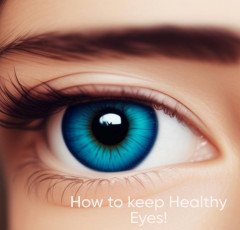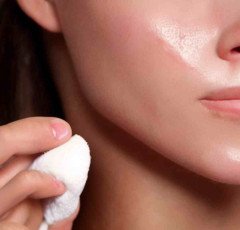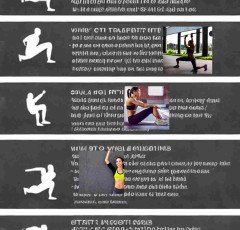
How to keep Healthy Eyes ?

Keeping your eyes healthy is essential for your overall health and quality of life.
The following advice will help you take good care of your eyes: -
A full eye exam should be scheduled with an eye care specialist (optometrist or ophthalmologist) at least once every two years, or more frequently if you have any eye issues now present or a family history of eye diseases. Regular examinations can aid in identifying eye issues early on and avert any complications.
Protect your eyes from UV rays
Prolonged sun exposure can harm your eyes and raise your risk of macular degeneration, cataracts, and other eye diseases. Even on cloudy days, always wear sunglasses that completely block UV rays when you're outside.
Observe the 20-20-20 rule
If you spend a lot of time staring at a computer screen or other digital display, take a break every 20 minutes. To lessen eye strain and avoid computer vision syndrome, focus your gaze for at least 20 seconds on a distant object that is 20 feet away.
Maintain proper lighting, To avoid eye strain, make sure your living and working places are well-lit. Place your computer or other electronic devices away from windows or strong light sources to reduce excessive glare.
Maintain proper hygiene by thoroughly washing your hands before touching your eyes, particularly if you wear contact lenses or need to apply eye drops. This lessens the possibility of eye infections.
Maintain hydration
Water consumption is crucial for general health, including eye health. Drinking enough water keeps your eyes' fluid balance in check and helps avoid dry eyes.
Eat a healthy, balanced diet that includes foods high in nutrients beneficial to the eyes, such as zinc, vitamins A, C, and E, and omega-3 fatty acids. For enhancing eye health, choose leafy greens, vibrant fruits, and fish like salmon.
Limit your alcohol intake and don't smoke, Smoking increases your chance of cataracts, age-related macular degeneration (AMD), and other eye problems. Reduced risk of vision issues can also be achieved by limiting alcohol consumption.
Blink frequently
People tend to blink less frequently when using digital gadgets or performing tasks that call for extreme concentration, which can cause dry eyes and eye strain. Keep in mind to intentionally blink to maintain eye lubrication.
Wear suitable protective eyewear, such as safety goggles or sports glasses, if you operate in a dangerous area or engage in an activity that could result in eye injury.
Manage long-term medical conditions
Eye health can be impacted by diseases including diabetes and hypertension. By effectively managing these illnesses with the assistance of medical specialists, vision issues linked to them may be avoided.
Get enough sleep: Sleep is crucial for maintaining eye health and general well-being. Eye fatigue and strain can result from sleep deprivation.
You may encourage and maintain healthy eyes throughout your life by implementing these routines into your daily life. Consult an eye care specialist right away if you have any worries about your eyes, persistent eye pain, or changes in your vision.
Limit your screen time. Reduce the time you spend using digital devices, such as computers, tablets, and cellphones. Long-term screen use can cause dry eyes, digital eye strain, and other vision-related issues. Take breaks and engage in non-screen-related activities.
Keep your eyes moist by using artificial tears or lubricating eye drops as advised by your eye care specialist if you feel dry eyes. Particularly in dry or air-conditioned conditions, these drops can keep your eyes pleasant and moist.
Avoid rubbing your eyes
Rubbing your eyes, particularly with unwashed hands, can introduce irritants and hazardous microorganisms that can cause infections or exacerbate preexisting eye disorders. Try using a cold compress or artificial tears instead if your eyes are scratchy or irritated.
Maintain a healthy weight, illnesses like diabetes and high blood pressure, which are associated to eye problems, are linked to illnesses like obesity and being overweight. You can lessen your risk of developing these problems by eating a balanced diet and exercising regularly.
Follow your eye care professional's instructions for proper cleaning, disinfection, and storing of your contact lenses if you wear them. Eye infections and problems can result from poor contact lens cleaning.
Limit eye strain when reading
To avoid eye tiredness when reading printed material, use appropriate lighting and place the reading material at a reasonable distance. It can also be beneficial to use a good reading lamp and make sure the text and background are sufficiently contrasted.
When wearing eye makeup, use caution not to share it with others and to replace it frequently to prevent bacterial infection. Additionally, take off your makeup before bed to avoid irritation and eye infections.
Manage allergies
Allergic reactions can cause itching, redness, and pain in your eyes. Determine your allergens, then take precautions to reduce exposure. Symptom relief through over-the-counter or prescription allergy medicines is also possible.
Avoid bad habits, Abuse of drugs, excessive alcohol use, or exposure to dangerous substances can impair your eyes and general health. Your eye health can be greatly improved by quitting or cutting back on such practices.
Know the history of your family's eye health: There may be a genetic component to some eye disorders, including glaucoma and macular degeneration. Knowing the history of your family's eye health will aid you and your eye care specialist in identifying and addressing any potential problems.
The eyes are delicate organs, therefore any odd or enduring changes in vision should be evaluated right once by an eye care specialist. You can safeguard your vision and maintain good eye health for years to come by taking preventive measures and establishing healthy habits.
Exercise on a regular basis
Physical activity supports good eye health and is helpful for your overall health. Regular exercise helps enhance blood circulation, which is crucial for supplying your eyes with nutrition and oxygen.
Dehydration can cause dry eyes and discomfort, so drink plenty of water and avoid being dehydrated. To keep your body and eyes well hydrated throughout the day, make sure to drink enough water.
Avoid straining your eyes while reading in low light by making sure there is adequate lighting when conducting close work or reading. It might be difficult to focus and cause eye fatigue when reading in low light.
Wear safety goggles or other protective eyewear when making home repairs or using power tools to avoid eye injuries from flying debris, dust, or chemicals.
Maintain good contact lens hygiene
If you wear contacts, make sure to abide by the eye doctor's suggested cleaning and disinfecting procedures. The risk of infections and other consequences is decreased with proper contact lens maintenance.
Manage your stress, Constant stress can lead to a number of health problems, such as eye strain and tension. To effectively control stress levels, try relaxing activities like yoga, deep breathing exercises, or meditation.
Understand your workplace's potential eye hazards, such as chemicals, particles, or radiation, and wear the proper protective eyewear that your company will give.
Maintain a clean and dust-free environment to lower the risk of eye discomfort brought on by allergens and airborne particles. Control indoor air quality.
Recognize the dangers of sports-related eye injuries and use protective eyewear made for the particular sport or activity you participate in if you want to avoid them.
Treat underlying medical disorders that may be affecting your vision, such as diabetes and hypertension. In order to manage these disorders and safeguard your vision, consult with your healthcare specialist.
Maintain proper hygiene when using cosmetics.
If you wear eye makeup, keep it clean and don't share it with others. To lower the chance of eye infections, replace eye makeup frequently.
Avoid smoking and exposure to secondhand smoke: Smoking has been associated with an increased risk of eye illnesses such macular degeneration and cataracts. Additionally, secondhand smoke exposure might damage your eyes.
Learn about common eye problems, symptoms, and treatments so that you may make an informed decision about your own eye health. Your desire to better take care of your eyes will be fueled by your awareness of how important eye health is.
Be cautious when using medications
Some may have eye-related negative effects. Discuss probable eye-related adverse effects with your healthcare provider if you use any long-term drugs.
You can further protect your eye health and lower the chance of vision issues by implementing these additional tips into your daily routine. Keep in mind that taking good care of your eyes will ensure that you have a lifetime of clear vision. Do not hesitate to consult a qualified eye care professional if you ever have questions about your eyes or encounter any unexpected symptoms.
When performing longer tasks that demand continuous focus, such as reading or using a computer, use the 10-10-10 rule to prevent eye fatigue. To relax your eye muscles and lessen eye strain, glance at someplace 10 feet away for 10 seconds once every ten minutes.
Control your allergies
Allergic reactions can cause swelling, itching, and redness in your eyes. To lessen the effects of your allergies on your eye health, take steps to control them, such as using antihistamines or avoiding triggers.
Eye irrigation should be done with caution. If you unintentionally get something strange in your eye, don't rub it. Instead, gently cleanse your eye with lukewarm, clean water. Consult a doctor right away if the object won't come out or if your eye is still itchy.
Take good care of your eyes when you sleep by taking out your contact lenses before bed because doing so increases your risk of developing an eye infection. Follow your eye care professional's recommendations if you use eye drops or ointments before going to bed.
Use proper eye protection when engaging in hobbies
To avoid eye injuries from flying items or impact, wear proper protective eyewear when performing tasks like woodworking, welding, or playing racquet sports.
Keep an eye on your children's eye health. If you have kids, make sure they get frequent eye exams so that any vision issues can be caught early. Early intervention for vision problems can support learning and development.
Control your blood pressure and diabetes because they can both have a negative impact on your vision. By using effective management and frequent monitoring, keep these situations under control.
Avoid using eye products that are defective or expired
Eyedrops, solutions, and prescriptions should all have expiration dates checked frequently. Any items that have expired or changed in appearance, consistency, or smell should be thrown out.
If you operate on a computer for extended periods of time, think about investing in computer glasses with an anti-reflective coating. These glasses are made to lessen eye fatigue and reduce glare.
Wear protective eyewear, such as goggles, to screen your eyes from dust, debris, and excessive wind when the weather is extreme, such as in strong winds or arid areas.
Avoid utilizing over-the-counter eye drops or therapies without first visiting an eye care expert while using DIY eye treatments. Some products can make your condition worse or interfere with how well they work.
Learn about your family's past
Know if your family has a history of inherited eye diseases. During your routine eye exams, let your eye care provider know about these disorders.
Be mindful of children's digital usage patterns: Encourage kids to use digital devices with good posture, take breaks from screens, and participate in outside activities.
Keep up with new developments in eye health, Research and developments in eye care are always changing. Keep up with cutting-edge procedures and technologies that can improve your vision.
Your specific needs for eye care may differ because your eyes are special. If you see any changes in your vision or eye health or if you have any specific worries, consult with an eye care specialist right away. Your eyesight and general health can be preserved with regular eye exams and strict attention to eye care procedures.
Protect your eyes from blue light because it might cause eye strain and interfere with your sleep. Blue light is released by digital devices. To lessen its negative effects on your eyes, think about utilizing blue light filters on your devices or putting on blue light-blocking eyewear.
Reduce the humidity inside the home since dry air might make dry eye symptoms worse. In dry seasons or in air-conditioned settings, using a humidifier can assist keep the humidity level in the air at a comfortable level for your eyes.
Make sure to remove your contact lenses before you swim or use a hot tub to reduce the chance of getting an illness from waterborne bacteria.
Use caution when utilizing home remedies: refrain from applying unapproved or unregulated products to your eyes. When in doubt or having any problems, seek the advice of a qualified eye care specialist.
Manage computer ergonomics
Make sure your desk is arranged ergonomically to lessen eye strain and encourage good posture. To prevent excessive head tilting, adjust the height and location of your monitor.
Be aware of drug side effects, Some medications may cause dryness or blurriness in your eyes, among other unpleasant eye effects. Consult your healthcare practitioner if your vision changes after starting a new drug.
Wear the proper protective equipment, such as helmets with face shields or goggles, if you participate in sports that have a risk of eye injury.
Limit screen time before night
To improve the quality of your sleep, avoid using digital gadgets just before bed. The natural sleep-wake cycle of your body can be hampered by the blue light that screens emit.
Remove your makeup properly by removing your eye makeup softly but completely to avoid any leftover products bothering your eyes overnight.
Avoid being in the direct path of the sun, When it's sunny outside, look for shade or wear a wide-brimmed hat in addition to UV-protective sunglasses to protect your eyes.
Learn basic first aid for eye injuries to be prepared to act quickly in the event of an eye emergency before professional assistance is available.
Keep a safe distance and exercise caution when using pyrotechnics to avoid eye damage. Never gaze directly at fireworks.
Items like contact lenses, eye drops, and glasses should not be shared with others in order to reduce the risk of infection.
Invest in high-quality eyewear
For the best vision correction and comfort, select eyeglasses or contact lenses that are fitted correctly and constructed of premium materials.
Exercise your eyes: While eye workouts won't improve your eyesight, they can help reduce eye strain and increase the flexibility of your eye muscles. For the best exercises, speak with an eye care specialist.
You can continue to promote the health of your eyes and safeguard your eyesight by implementing these extra suggestions into your everyday routine. Keep in mind that sustaining eye health depends on prevention and early detection. If you have any worries about your eyes or eyesight, make eye care a priority and seek the advice of an eye care specialist.
Avoid excessively rubbing your eyes
Aggressive rubbing of the eyes can cause discomfort and raise the possibility of eye infections. Instead of scratching or using a cold compress, try blinking or rubbing your eyes.
Maintain proper eye hygiene by cleaning your glasses or contact lenses as directed by the manufacturer on a regular basis to avoid dirt and debris accumulation.
Keep your hands away from your eyes: Touching your eyes too frequently can cause infections by spreading germs from your hands to your eyes.
Observe any abrupt or major changes in your vision, such as fuzziness, double vision, or floaters, and pay attention to them. These might be symptoms of underlying eye diseases that need to be treated right now.
Precautions for surroundings that are dusty or windy: If you find yourself in an area that is dusty or windy, wear protective eyewear to protect your eyes from flying debris.
Use good swimming pool hygiene: When using hot tubs or pools, be mindful of chlorine and other chemicals that can irritate the eyes. For eye protection, think about putting on swim goggles.
Wear safety goggles when using power tools, handling chemicals, or mowing the lawn to prevent eye injuries while gardening and yard chores.
Be careful when using domestic cleaning products
Make sure to keep your eyes away from direct contact with any chemicals, aerosols, or household cleaning agents. It's also crucial to have proper ventilation.
Maintaining eye health throughout pregnancy: Pregnancy can have an impact on your eyes, causing dryness or changes in vision. If you are pregnant or intend to become pregnant, let your eye care provider know.
Avoid using eye drops for an extended period of time; doing so can irritate your eyes or exacerbate your symptoms, particularly if the eye drops contain preservatives. Observe the usage guidelines provided by your eye doctor.
Address eye dangers at work
If your job requires you to be exposed to potentially harmful substances or circumstances, make sure your employer is following safety procedures and providing the necessary protective equipment.
Children should be taught the value of wearing eye protection and the dangers of having dangerous items or liquids come into contact with their eyes.
Manage your stress and anxiety, Prolonged stress and worry can harm your eyes as well as your general health. Find appropriate coping mechanisms for stress, such as exercise, meditation, or counseling.
Do not use prescription lenses or spectacles that are out-of-date: Check your prescription glasses or contact lenses' expiration date frequently. Using out-of-date medicines could cause pain and stress.
Encourage youngsters to read in optimal lighting, adopt excellent posture when using electronics, and take regular breaks from screen usage to promote healthy eye habits.
Your overall well-being depends on your eye health. You can take proactive measures to protect your vision and stave off any eye issues by using these suggestions and keeping up with routine eye exams. If you have any worries or inquiries about the health of your eyes, always consult a qualified eye care specialist.























































































 NordVPN
NordVPN  TitTok Revolution
TitTok Revolution  One World Collection
One World Collection  Unlimited access to classes on illustration, photography, design, film, music
Unlimited access to classes on illustration, photography, design, film, music  Online Marketing
Online Marketing  Amazon Best Selling Products
Amazon Best Selling Products  Best Selling Books
Best Selling Books  SOFAS
SOFAS  All Wireless Products
All Wireless Products  Favorite Company (Cuelinks)
Favorite Company (Cuelinks)  Only For The United States
Only For The United States  Best Home Appliances
Best Home Appliances  SEO Checklist
SEO Checklist  Men Clothing
Men Clothing  Creative Brief For Video Shoot
Creative Brief For Video Shoot  BEST SELLER TOP10
BEST SELLER TOP10  The Click Engine
The Click Engine  ASUS Laptop
ASUS Laptop  NordPass
NordPass  ELECTRONIC ACCESSORIES
ELECTRONIC ACCESSORIES  Women Fashion
Women Fashion  Graphics & Design
Graphics & Design  Smart Doorbell
Smart Doorbell  Best Sellers On Amazon
Best Sellers On Amazon  Top Rated From Amazon
Top Rated From Amazon  ASPINAL LONDON
ASPINAL LONDON  Online Technology Classes
Online Technology Classes  Unreal Engine 5 For Beginners Learn The Basics Of Virtual Production
Unreal Engine 5 For Beginners Learn The Basics Of Virtual Production  1150+Trendy kids coloring pages Bundle
1150+Trendy kids coloring pages Bundle  RPM 3.0
RPM 3.0  Best Robotic Vacuum Cleaners
Best Robotic Vacuum Cleaners  Acer Laptop
Acer Laptop  NordLocker
NordLocker  Hello Theme
Hello Theme  Hot Bags For Pain Relief
Hot Bags For Pain Relief  Sennheiser
Sennheiser  Artificial Intelligence
Artificial Intelligence  The Secret Email System
The Secret Email System 
















